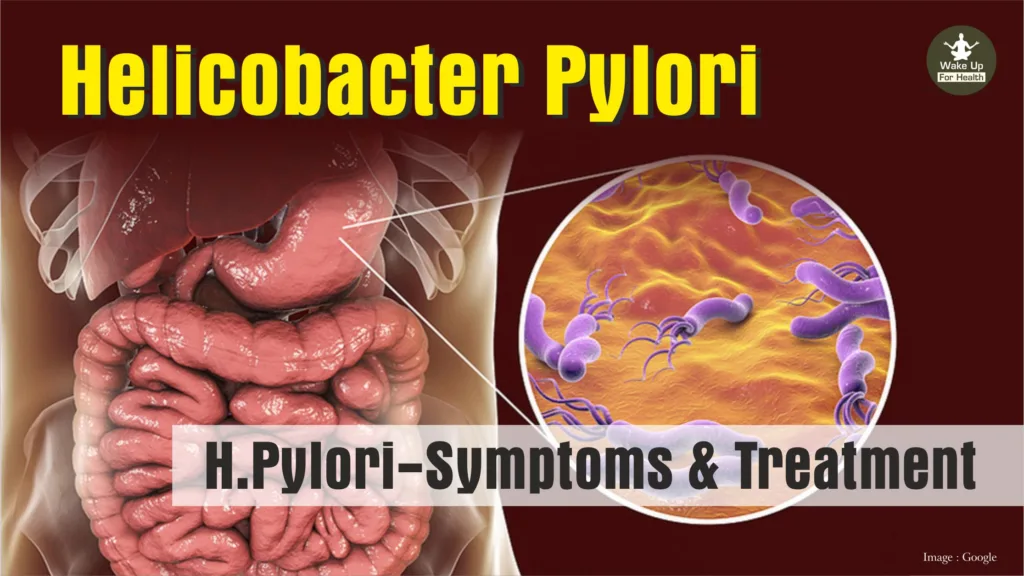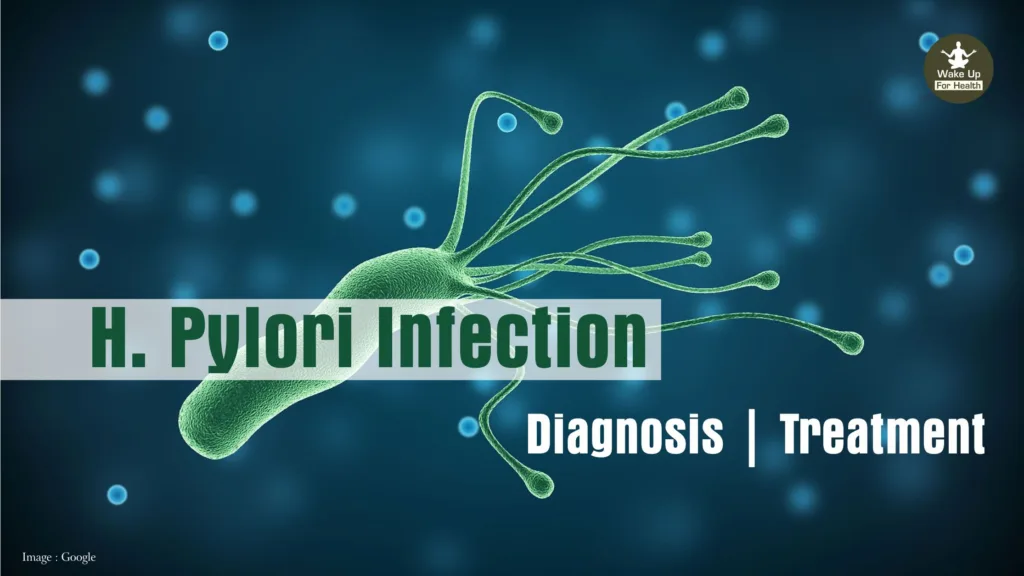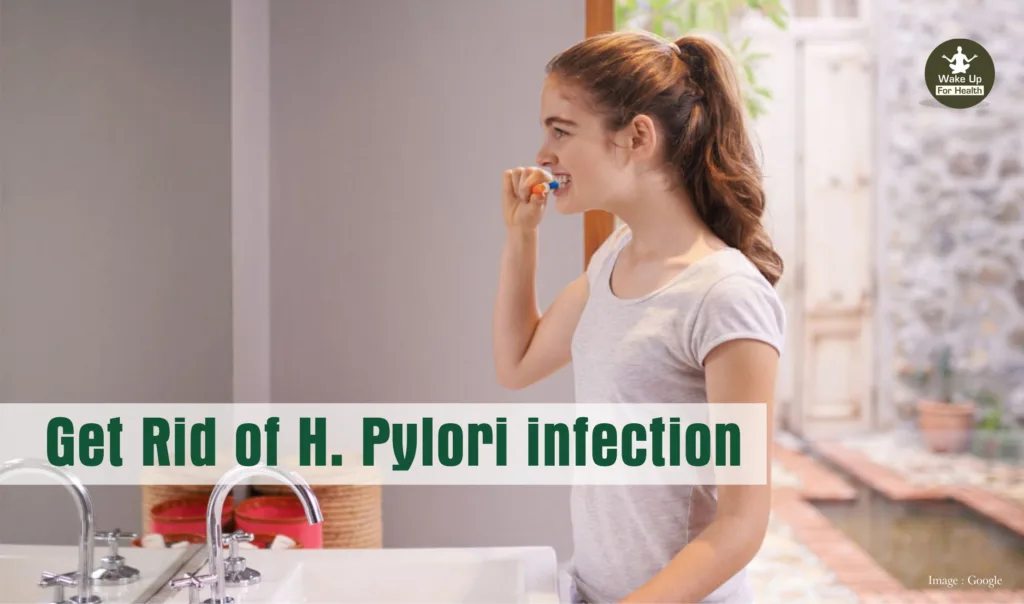Helicobacter Pylori infection is an infection caused by gram-negative bacteria. Due to this bacteria, there is a problem of chronic inflammation or infection in the stomach. These bacteria spread infection in the digestive system after entering the body. Some people do not have symptoms of H. pylori infection in the beginning. This bacteria also causes stomach ulcers if it stays inside the body for years. If the treatment of Helicobacter pylori infection is not done at the right time, then this bacteria can also cause stomach cancer. So, we will know more below about H. Pylori Bacterial Infection and its causes, symptoms and treatment.

H. Pylori infection can happen from young children to old people. Because H. Pylori infection may not show symptoms, people often go undiagnosed about the initial infection. Contaminated food and drink can be the main cause of H. pylori infection. This infection is more common in developing countries. Up to 10% of children and 80% of adults are susceptible to H. Pylori Infection.
Through this article, know what causes H. pylori infection and how to recognize the symptoms of H. pylori infection.
Understanding H. Pylori, Symptoms, Causes, Cure Options, Managing H. Pylori Infection
Symptoms of H. Pylori infection are usually not visible. Some people may have episodes of H. Pylori infection. Symptoms of this infection can also be seen in children. Learn about the symptoms of H. Pylori infection.
• Belching
• Bloating
• Nausea and vomiting
• Feeling of Upset stomach
• Abdominal Pain
• Blood Coming with Vomiting
• Change in the Color of the Stool
• Feeling Tired
• Decreased Red Blood Cells
• Loss of Appetite
• Peptic Ulcers
• Heartburn
• Bad Breath
H. Pylori causes infectious disease. This bacteria lives in the gut of some people and does not cause any symptoms. H. Pylori produces the enzyme urease while living inside the body, due to which the bacteria are able to live easily in the stomach. The urease enzyme reacts with urea to form ammonia.
How Much You Care About Jaundice?
Ammonia neutralizes the stomach’s acid, allowing the organism i.e. bacteria to survive in the tissue. By reading the symptoms of H. Pylori infection given above, you must have come to know that how this bacteria works to harm the body. H. Pylori can spread easily from person to person through saliva, fecal contamination of water and food, or poor hygiene.

How to Diagnose of H. Pylori & Infection?
To diagnose H. Pylori infection, the doctor may perform a physical examination. The doctor looks at the area of pain in the abdomen and also listens to the sounds coming from the abdomen. Also, infection diagnosis is done through blood test, stool test, urea breath test and endoscopy. You can ask the doctor about the precautions to be taken before endoscopy. Once the infection is diagnosed, the doctor prescribes antibiotics.
How to Treat of H. Pylori Infections?
To treat H. Pylori infection, the doctor may recommend a combination of two different types of antibiotics to the patient as well as other medicines. By doing this, they work to reduce stomach acid. Reducing stomach acid shows more effect of antibiotics.
Doctors may recommend proton-pump inhibitors, metronidazole, and amoxicillin. Medicines can also be changed according to the medical history. It is advised to take medicines for one to two weeks and then follow up test is also done. The above information is not a substitute for medical advice. You can contact the doctor for more details.
What is the Treatment of HIV – AIDS?
What is the Relationship Between H. Pylori Infection and Peptic Ulcer?
A peptic ulcer is an open sore that can occur in the stomach lining or the top of the small intestine (Duodenum). The ulcer which occurs in the stomach is called gastric ulcer. Most ulcers are caused by Helicobacter Pylori infection. The infection spreads from person to person through close contact with fecal matter or vomit.
The bacteria causes the protective stomach mucus to break down, allowing acid to seep into the sensitive lining. Acid and bacteria cause ulcers in the stomach lining. H. Pylori test is also done for those patients who have peptic ulcer problem.
Keep These Things in Mind.

You must have come to know from the above information that due to which H. Pylori infection spreads and how it can cause cancer. If this infection is not treated on time, it can also be fatal. Along with getting treatment for H. Pylori, you also have to take some precautions, so that you do not get this infection again.
• Hygiene needs special care to avoid H. Pylori infection. There are many micro-organisms around us, which can infect us. You should wash your hands thoroughly before eating, before using the bathroom. It is better that you do not feed your contaminated food to others because this infection can also spread through saliva.
• The vegetables or fruits you are about to use, keep them in water for a while and then clean them. Never eat vegetables or fruits without washing them.
• If it is not very important, then avoid eating outside food. The main reason for the spread of H. Pylori is through contaminated food and water. It is better if you carry water and food from home.
• Including nutritious food in food can help you get rid of many problems. You should also drink sufficient amount of water.
• Do not eat any vegetable or meat half raw. Eat well cooked food.
Keeping the above things in mind, you can avoid Helicobacter pylori infection. Even then, if you see symptoms of H. Pylori infection, then definitely see a doctor and get treatment.
Hygiene-rich environment and good lifestyle work to protect against many diseases. If you take precautions, then the chances of getting sick also reduce. You should contact a doctor immediately if you have symptoms of H. pylori infection. If you are still facing any problem, contact a doctor immediately. We hope you have liked this article.
F.A.Q.
Q.1 Is H. Pylori a serious disease?
Answer : It can cause open sores called peptic ulcers in your upper digestive tract. It can cause stomach cancer. It may be passed or spread from person to person by mouth, such as by kissing. It may also be passed by direct contact with vomit or stool.
Q.2 How long can you live with H. Pylori?
Answer : Pylori infection usually lasts for life unless it is treated. Most people infected with H. pylori don’t have any symptoms or health problems related to the bacterium. Some people with long-lasting infection develop symptoms, such as stomach pain, nausea or vomiting.
Q.3 Can H. Pylori be transmitted through kissing?
Answer : H. pylori infection can be spread through kissing, oral sex, and contaminated food or drinking water. If you’re taking antibiotics to treat H. pylori, you’re still contagious until tests show the infection is gone.
Q. 4 Can you get H. Pylori from a toothbrush?
Answer : H. pylori is a contagious bacterium. H. pylori is likely transmitted person-to-person through either fecal/oral exposure (such as eating contaminated food or drinking contaminated water, or swimming in contaminated bodies of water) or oral/oral exposure (such as kissing or sharing toothbrushes)
Q.5 Can I transmit H. Pylori to my family?
Answer : H. pylori is commonly transmitted person-to-person by saliva. The bacteria can also be spread by fecal contamination of food or water. In developing countries, a combination of untreated water, crowded conditions, and poor hygiene contributes to higher H.
(Disclaimer : The purpose of this health-related article is to wake you up and aware of your health and to provide health-related information. Your doctor has a better understanding of your health and there is no substitute for their advice.)
1 thought on “H. Pylori Infection: Symptoms, Causes, and Cure”